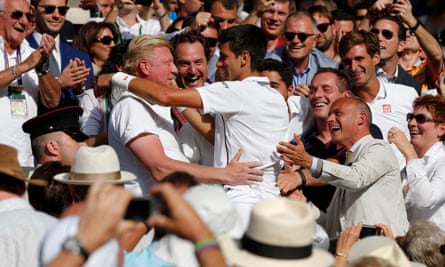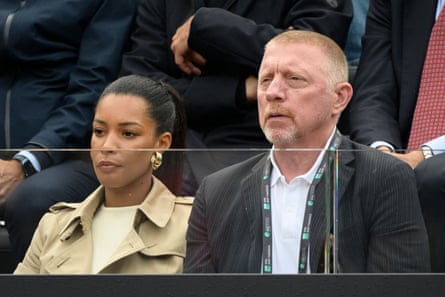“The thing with advice is that, in hindsight, you’re always smarter,” says Boris Becker on a blue-eyed Paris morning as he contemplates what words of wisdom he would give his 17-year-old self, given all that has happened since. He pauses. Mulls it over. And ultimately decides: not a lot, actually.
“If I had asked anybody in 1985, ‘Can I win Wimbledon?’ the advice would have been no,” he says. “And I think 99% of people would have said it’s impossible to defend it when I was 18. But I did it. So good advice is a double-edged sword.”
Becker is in full flow now, fascinating and defiant. “I have children. And you give them the best advice you can. But they have to find out what’s wrong, what’s true and what’s not, what’s possible and what’s impossible.”
In some ways, you get Becker’s point. Why risk blunting those irrepressible animal spirits that took him to six grand slam titles, an Olympic doubles gold medal and so much more? Then again, they also sent him tumbling down a path of lurid tabloid headlines, financial peril and 231 days in jail after a court ruled he had acted “deliberately and dishonestly” by hiding hundreds of thousands of pounds of assets after he was declared bankrupt.
Becker makes it clear early on that he doesn’t want to march back over that particular patch of old ground. Even a vague question about whether he is in a good place now is met with an impeccably polite putting down of the shutters as he doesn’t want to talk about his private life. Once we move on to next week’s French Open, and his return to the commentary box, he opens up his shoulders and starts swinging.
He is particularly compelling when it comes to Emma Raducanu’s recent woes and his fears for her future. Like the 20-year-old Briton, Becker won grand slam titles as a teenager only to develop wrist injuries. While wishing Raducanu a speedy recovery, he admits he is concerned. “The surgeries that she has had are, in my opinion, career-threatening,” Becker says. “Having surgery on your playing wrist, and as a two-handed player, the other wrist – and then on your ankle – is tough to bear for a young woman.”
Becker clearly admires Raducanu but knows from first‑hand experience how hard it is to have a permanent target etched on your back. “Tennis is a completely different game when you go into court and you have nothing to lose,” he says. “Anybody can play then. It’s a whole different sport when you become the hunted.”

Has making changes to her team since winning the US Open in 2021 been another factor in Raducanu’s struggles? Becker hesitates. “I’m not in her inner circle so I don’t know all the things that went off, although I’ve seen the coaching changes. But as a young woman, all of a sudden being on top of the mountain, you have to really dig in and find the resources and the team around you to guide you through the next 10 years.
“Its about mindset and talent, team, approach and circumstances. She’s not the first one who wasn’t able to do it. And she won’t be the last. But if she was good enough to win a grand slam Boris Becker: ‘Tennis is a different sport when you become the hunted’ | Boris Becker once, she’s good enough to win one again.”
For much of his career, Becker was guided by Ion Tiriac, a stern Romanian who was known as the Brasov Bulldozer. Would someone similar help? “Ion was an extremely important mentor because he’d been there before,” he says. “And yeah, there are a couple of people – but not many – who could help her. But, first of all, she has to be ready for it. Her parents have to be ready for it. And if that’s not the case, then nobody can help.”
Becker was still in prison during the French Open last year and he expects Roland Garros to have a very different vibe on his return now Roger Federer and Serena Williams have retired, Rafael Nadal is injured, and Novak Djokovic is struggling with form.
Does he sense a changing of the guard? “It’s already happened,” he says. “Carlos Alcaraz became world No 1 after winning the US Open last year – that’s your evidence. There are plenty of other young players knocking on the door, including Jannik Sinner and Holger Rune. Then we have to mention the Russians – we don’t like to do so but we have to as they’re good enough.”
Becker believes it would be foolish to write off Djokovic, who he coached for three years from 2013, despite his recent performances. “Clay is not his best surface, but in the last couple of years he was able to pull it back together at the French. As long as he’s healthy, and as long as he wants to play, he is always going to be one of the favourites to win a grand slam.”
Becker also feels Djokovic doesn’t always get the love or appreciation he deserves as a player or person. “He’s actually a very outgoing, very worldly man. Sometimes he comes across as a bit of a tennis machine. But when he’s not in his office, he is very charming. You can talk to him about business, politics, about music, and he’s a good guy.
“He’s also a real tennis historian. He understands who was there beforehand and he wants to make a mark. Which he has done. Then he’s a perfectionist, like all superstars. He wants to play the perfect match, which in his case probably happened once or twice.”
During last year’s Wimbledon final he was in prison, sharing the same cloying space as murderers, child molesters, drug dealers and rapists. There were also two death threats made against him, with Becker telling German TV last December that one was particularly scary. “I thought I would lose my life in Wandsworth. Someone, a murderer I later found out, wanted my coat and he wanted money and he said he would kill me if he didn’t get it.”
While Becker does not want to go into details about his time inside, he does reveal he was allowed to watch Djokovic lift his seventh Wimbledon title. “I was very emotional when he won. It was a great statement and he’s a friend so I was happy to see him win.
after newsletter promotion
“On the other side, I like Nick Kyrgios and what he brings to the competition. So I want him back healthy and I want him back in with the same attitude that he had last year. Because it’s great for tennis.”
The question of when Becker will grace the All-England Club again is also uncertain, with reports suggesting he could be banned from re-entering Britain for 10 years. He doesn’t want to say how long it may be, but the thought of a prolonged absence clearly hurts.
“Wimbledon is my favourite tournament. I have won it a number of times. I’ve commentated on the final 20 times. I used to live in Wimbledon. So the club is very, very close to my heart and I’ll be watching it from afar.”

Becker also believes his life experiences will help his charity work and is a keen supporter of Laureus Sport for Good, which works to improve the lives of kids from underprivileged communities. “We’ve reached over six million children in over 140 countries. We use sport as a platform to spread the word to do the right thing.”
He is loosening up now, so it feels appropriate to ask why he believes he remains popular in Britain despite his mistakes. “Well, I lived in the country for a long time and so I was able to show my human side: my personality, my character. Apparently, we have a similar sense of humour, which is unusual for a German. You have a very dark sense of humour. So I get their jokes and they get my jokes. That’s not necessarily the case in Germany but it is in the UK.
“It’s a wonderful country. And London is just one of the most amazing cities in the world.”
Our time is nearly up and with Becker radiating health and happiness it feels worth chancing a more direct question on his time in prison. Becker listens, then starts to smile. “I know as a professional journalist you have to ask. I respect it. And I’m living a good life again.”
As we shake hands, Becker whispers something else, which I later pick up on tape. “Say hello to Wimbledon for me,” he says. One day, he hopes they will be able to reply in person.
Boris Becker is a Laureus Academy Member and works on their Sport for Good projects.

